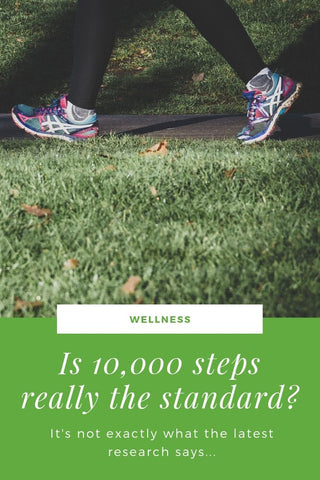10,000 Steps Rule Debunked in Breakthrough Research
You need to walk every day… but maybe not as much as you think. Those who rack up 10,000 steps a day have long been lauded for their exemplary fitness, but at the American College of Sports Medicine (ACSM) 2019 Annual Meeting (the globe’s premiere exercise science conference) they may have just flipped the script.
Last week they presented the first research study to examine the relationship between step intensity and long-term health. A breakthrough when very little research actually exists on the subject.
The TLDR: you don’t really need 10,000 steps to achieve optimal health and reduce risk of death.
Of course, there’s more to it than that! The study followed 16,000 women aged 45 or older (the mean age was 72) for 4.3 years and tracked their steps for the duration. Through the course of the study, they achieved a mean of 5499 steps per day.
Researchers discovered that there is a significant decrease in risk of death as steps per day increase.
-
4363 steps / day = 41% decrease
-
5905 steps / day = 46 % decrease
- Each 1000 additional steps / day = another 15% decrease
- 7500 steps / day is where results leveled off
Another key finding that people should keep in mind: the intensity of the steps had no impact on mortality rates. Brisk, heavy, light steps had no bearing on the health benefits. So just walk!
This really aligns with the 2018 Physical Activity Guidelines for Americans, which eliminated specific instruction for movement and told everyone to...JUST MOVE! Any movement, any kind, all of it counts.

The study’s lead author, I-Min Lee, MBBS, ScD of Harvard Medical School, said she found the results especially encouraging for sedentary adults who see 10,000 steps per day completely unattainable. Little research supports the long-held adage that you’ve gotta log 10,000 steps for your movement to mean anything. This new information will, hopefully, encourage people to get as many steps as they can, without fearing a shortfall that, frankly, doesn’t matter anyway.
Walking is one of those good things you can really never have too much of, though. A 2016 study from Thailand tracked the steps of 30 people, 70% of whom were women. They found that hitting the 10,000 steps goal had tremendous mental health benefits like reduced anxiety, depression, anger, and fatigue. The physical benefits included lower body weight, BMI, and waist circumference. It’s of note that this study is considerably smaller than the ACSM’s, both in sample size and trial length (4 years vs. 12 weeks).
No matter the study, there’s no arguing that the simplest effort of walking is one of the best things you can routinely do for your body.
Do you get 10,000 steps per day? Or does this news encourage you to move just a little bit more no matter the count?
You may also like:


